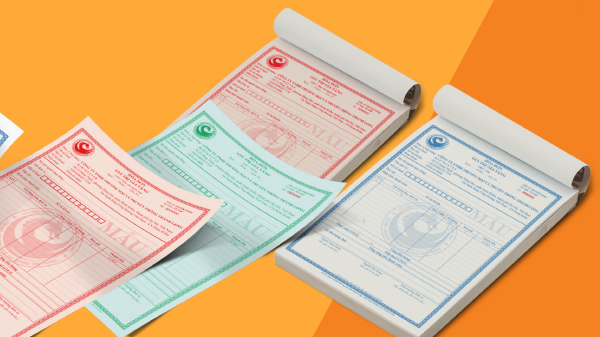Instructions on the text, numbers and currencies on invoices in Vietnam
What are the instructions on the text, numbers and currencies on invoices in Vietnam? - Hoang Chau (An Giang)

Instructions on the text, numbers and currencies on invoices in Vietnam (Internet image)
Regarding this issue, LawNet would like to answer as follows:
1. Instructions on the text, numbers and currencies on invoices in Vietnam
Instructions on the text, numbers and currencies on invoices in Vietnam according to Clause 13, Article 10 of Decree 123/2020/ND-CP are as follows:
- The text on an invoice must be written in Vietnamese language. If foreign language text is necessary, it must be placed between parentheses ( ) or next to the Vietnamese text, in which case it must be smaller than the Vietnamese text. If the text has to be written in Vietnamese without diacritics, it must not cause the readers to misunderstand its contents.
- Numbers on the invoice must be written in Arabic numerals: 0, 1, 2, 3, 4, 5, 6, 7, 8, 9. The seller may decide whether to use a period (.) as thousands separator and a comma (,) as a decimal separator, or vice versa.
- The currency on invoices shall be VND, expressed as “D".
= If a foreign currency is used in an economic/financial transaction in accordance with regulations of the law on foreign exchange, the unit price, amounts, VAT amount by VAT rate, total VAT amount, and total amount payable shall be written in the foreign currency. The currency unit shall be the name of that foreign currency. The seller shall write the exchange rate of the foreign currency to VND on invoices in accordance with the Law on Tax administration and its instructional documents.
= International currency symbols shall be used. (e.g. 13.800,25 USD – Thirteen thousand eight hundred US dollars and twenty five cents, or 5.000,50 EUR - Five thousand euros and fifty cents).
= If the goods/services are paid for in a foreign currency in accordance with the Law on foreign exchange and on which tax is also paid in a foreign currency, the total amount payable shall be written in the foreign currency instead of converted into VND.
2. Cases of exemption from having all the contents of e-invoice in Vietnam
Cases of exemption from having all the contents of e-invoice in Vietnam according to Clause 14, Article 10 of Decree 123/2020/ND-CP are as follows:
- An electronic invoice does not necessarily have the buyer’s electronic signature, even if goods/services are sold overseas. In case the buyer is a business establishment and both the buyer and the seller agrees to use digital or electronic signatures on the e-invoice issued by the seller, the invoice shall bear the buyer’s and the seller’s digital or electronic signatures as agreed.
- E-invoices separately issued by tax authorities do not necessarily bear the buyer’s and the seller’s digital signatures.
- The e-invoice issued by a supermarket or shopping mall to a non-business buyer does not necessarily bear the buyer’s name, address and TIN.
E-invoices for sale of oil and gas to non-business individuals do not necessarily bear the name, form number, reference number, and number of the invoice; the buyer’s name, address, TIN, electronic signature; the seller’s digital or electronic signature; VAT rate.
- E-invoices in the form of stamps, tickets or cards do not necessarily contain the seller’s digital signature (except for those authenticated by tax authorities), the buyer’s information (name, address and TIN), VAT rate and VAT amount. Pre-priced electronic stamps, tickets and cards do not necessarily contain the unit, quantity and unit price.
- Electronic air tickets issued via websites and e-commerce systems to buyers that are non-business individuals following international practices do not necessarily bear the reference number, form number and number of the invoice, VAT rate, the buyer’s TIN and address, and the seller’s digital signature.
In case a business or non-business organization buys air tickets, the electronic air tickets issued via websites or e-commerce systems to individuals of that organization following international practices are not considered e-invoices. Airliners shall issue e-invoices with sufficient information and provide them for their buyers.
- Invoices for construction and installation, or construction of houses for sale under installment plans do not necessarily bear the unit, quantity and unit price.
- Delivery and internal transfer note shall bear information on the internal transfer order, recipient’s name, deliverer’s name, sending address, receiving address, and vehicle.
To be specific: the buyer’s name is the recipient’s name and the buyer’s address is receiving address; the seller’s name is the deliverer’s name and the seller’s address is sending address and vehicle; tax rate, tax amount and total amount payable are not required.
Delivery notes for goods sent to sales agents shall specify information on the economic contract, deliverer, vehicle, sending address, receiving address, name of goods/products, unit, quantity, unit price and amounts. To be specific: number and date of the signed economic contract; deliverer’s full name, delivery contract (if any), and the seller’s address which is the sending address.
- Invoices for interline payment between airliners issued in accordance with regulations of the International Air Transport Association (IATA) do not necessarily have the reference number and form number of the invoice, the buyer’s name, address, TIN and electronic signature, unit, quantity, unit price.
- Invoices issued by an airline to its agents according to reports verified by two parties and general statements do not necessarily contain the unit price.
- Invoices for construction, installation, production or provision of products/services of enterprises servicing national defense and security in accordance with the Government's regulations do not necessarily bear the unit, quantity and unit price, and shall have the goods/services provided under the signed contracts written at the columns of name of goods/services.
- Key word:
- invoices
- in Vietnam
- Cases of land rent exemption and reduction under the latest regulations in Vietnam
- Economic infrastructure and social infrastructure system in Thu Duc City, Ho Chi Minh City
- Regulations on ordination with foreign elements in religious organizations in Vietnam
- Increase land compensation prices in Vietnam from January 1, 2026
- Determination of land compensation levels for damage during land requisition process in Vietnam
- Who is permitted to purchase social housing according to latest regulations in Vietnam?
-

- Urgently submit to the Government of Vietnam the ...
- 10:11, 26/11/2024
-

- Emergency response and search and rescue organizations ...
- 10:29, 11/09/2024
-

- Handling of the acceptance results of ministerial ...
- 09:30, 11/09/2024
-

- Guidance on unexploded ordnance investigation ...
- 18:30, 09/09/2024
-

- Sources of the National database on construction ...
- 16:37, 09/09/2024
-

- Notable new policies of Vietnam effective as of ...
- 16:26, 11/04/2025
-
.Medium.png)
- Notable documents of Vietnam in the previous week ...
- 16:21, 11/04/2025
-
.Medium.png)
- Notable documents of Vietnam in the previous week ...
- 16:11, 02/04/2025
-
.Medium.png)
- Notable new policies of Vietnam to be effective ...
- 16:04, 02/04/2025
-
.Medium.png)
- Notable new policies of Vietnam effective from ...
- 14:51, 21/03/2025

 Article table of contents
Article table of contents
